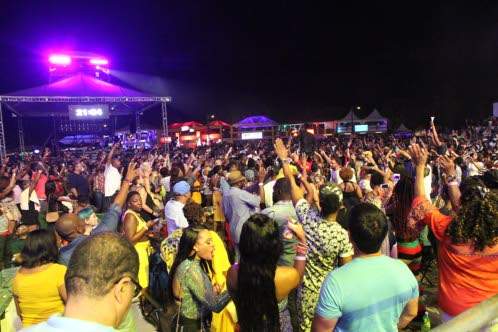THERE are few countries so associated, ingrained with and built on the value of music as Jamaica. Few countries can claim to have created and own a particular genre, let alone lead the world in a number of them. This is far from being centered on reggae, dancehall, Bob Marley, Peter Tosh and Island Records. This is demonstrated every day, everywhere, in Jamaica.

From the perspective of one of the authors of this article looking at Jamaica from the outside, the history, heritage and current crop of talent is enviable. This is why Kingston is a UNESCO City of Music and why debates around music, including the recent comments from the political leader and some thought leaders regarding dancehall music, garner such attention. Dancehall, like any genre, is a reflection of one’s personal experience and Jamaican music, be it from Lee “Scratch” Perry or Demarco.
This demonstrates a unique opportunity for Jamaica to leverage the value of music in the country to accelerate economic recovery from the pandemic and, in the meantime, create a more resilient music and cultural sector. But this requires taking this heritage, history and asset and looking at it differently. Instead of seeing it purely as a tourism asset, one that is a powerful tool in re-energizing destination marketing or purely as a commercial enterprise, Jamaica has the opportunity to view its music output — past and present — as an ecosystem. And suppose that’s done across all levels of government? In that case, it will create a significant competitive advantage in the sector, bringing sales, wealth, and economic growth and creating new opportunities for all of society.

Exploring music as an ecosystem requires a wholesale analysis of the role of music in civic society — from nursery to nursing home. This means that music is considered in strategic planning both top-down and bottom-up — be it for a community, a business improvement district, or a luxury resort. This means ensuring that music education is well-funded and included in all national curricula. It would ensure all communities have adequate building standards, so any new residential properties or hotels built next to existing venues are soundproof. It would ensure a fair pay policy is deployed for all artistes, so any time their music is used to promote Brand Jamaica they are fairly paid at union rates for the content. It would develop a genre-agnostic marketing policy, so Jamaican heavy metal, jazz or blues is not bypassed in favor of reggae or dancehall. It would ensure all communities have music officer positions to act as mediators between civic government and local communities.
It would incorporate music technology into accelerator and incubator programs to foster the next generation of creative entrepreneurs. And it would create a dialogue between artistes and the Government, through a music reconciliation forum which brings together disparate voices, to understand better the challenges inherent in Jamaica’s music community and how music can be used as a tool for harm reduction and community activism. But to do so Jamaica needs a wholesale music ecosystem strategy, one led by the Government but composed of ideas led by musicians, local communities and stakeholders across the entire island. There is an urgent need to designate spaces within inner-city communities as zones of creativity where people can practice, hone and refine their artistic and creative skills within the framework of a creative city initiative. In these violence-free zones, incubators will provide a space to train participants (both young and mature) in the foundational creative and managerial skills that will improve their abilities to make it in the music industry at various levels. The plan would include identifying opportunities for employment and entrepreneurship for participants through an apprenticeship program, grant funding and revolving loan programs, and providing an alternative to the violence and sense of hopelessness plaguing many communities in Jamaica.

Doing so would not only honour the legacies of the past but strengthen them. This could be part of the overall cultural policy initiative under the creative industry incentivisation pillar of the ‘Four Pillars Cultural Policy Model’ outlined in a previous article.
On January 28, 2020 Prime Minister Andrew Holness stated that “Jamaica’s music has been such a powerful tool, not just for Jamaica but for the world.” We strongly agree; one of the writers of this piece grew up in Canada and learned more about Jamaica through its music and culture than he did about most Caribbean islands. There are opportunities to reignite this powerful tool even more, but it takes bold leadership, wide stakeholder engagement and an understanding that music is more than history, more than lyrics and more than individual artistes. Music means jobs, skills, community development and, as we recover from the pandemic, a way to accelerate growth equitably. We believe there’s no better place in the world to use music this way than Jamaica.

Shain Shapiro is a globally recognized thought leader at the convergence of music, culture and urban policy. He is the founder and executive chairman of Sound Diplomacy and the executive director of the not-for-profit, global Center for Music Ecosystems. Sound Diplomacy is the leading global advisor on growing music and night-time economies in cities and places. He holds a PhD from the University of London and was one of the top 10 Creative Entrepreneurs in Britain in the British Council’s h100 list. His début book, The Music Ecosystem, is due out in 2023.
Dennis Howard has worked in the creative industry for over thirty years and holds a PhD in Cultural Studies and Ethnomusicology from The University of the West Indies. A Grammy-nominated music producer, he is the managing director of the Institute of Cultural Policy and Innovation — a leading creative industry consultancy — and is a lecturer at the Institute of Caribbean Studies, UWI Mona. He’s the author of Rantin’ From Inside the Dancehall and the Creative Echo Chamber: Contemporary Music Production in Kingston, Jamaica.


You must log in to post a comment.